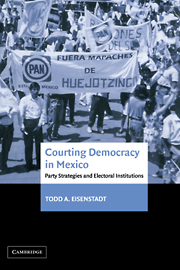Book contents
- Frontmatter
- Contents
- Figures and Tables
- Acknowledgments
- Courting Democracy in Mexico
- 1 Electoral Courts and Actor Compliance: Opposition-Authoritarian Relations and Protracted Transitions
- 2 Ties That Bind and Even Constrict: Why Authoritarians Tolerate Electoral Reforms
- 3 Mexico's National Electoral Justice Success: From Oxymoron to Legal Norm in Just over a Decade
- 4 Mexico's Local Electoral Justice Failures: Gubernatorial (S)Election Beyond the Shadows of the Law
- 5 The Gap Between Law and Practice: Institutional Failure and Opposition Success in Postelectoral Conflicts, 1989–2000
- 6 The National Action Party: Dilemmas of Rightist Oppositions Defined by Authoritarian Collusion
- 7 The Party of the Democratic Revolution: From Postelectoral Movements to Electoral Competitors
- 8 Dedazo from the Center to Finger Pointing from the Periphery: PRI Hard-Liners Challenge Mexico's Electoral Institutions
- 9 A Quarter Century of “Mexicanization”: Lessons from a Protracted Transition
- Appendix A Coding the Postelectoral Conflict Dependent Variable
- Appendix B Coding of Independent Variables
- Bibliography
- Index
1 - Electoral Courts and Actor Compliance: Opposition-Authoritarian Relations and Protracted Transitions
Published online by Cambridge University Press: 22 September 2009
- Frontmatter
- Contents
- Figures and Tables
- Acknowledgments
- Courting Democracy in Mexico
- 1 Electoral Courts and Actor Compliance: Opposition-Authoritarian Relations and Protracted Transitions
- 2 Ties That Bind and Even Constrict: Why Authoritarians Tolerate Electoral Reforms
- 3 Mexico's National Electoral Justice Success: From Oxymoron to Legal Norm in Just over a Decade
- 4 Mexico's Local Electoral Justice Failures: Gubernatorial (S)Election Beyond the Shadows of the Law
- 5 The Gap Between Law and Practice: Institutional Failure and Opposition Success in Postelectoral Conflicts, 1989–2000
- 6 The National Action Party: Dilemmas of Rightist Oppositions Defined by Authoritarian Collusion
- 7 The Party of the Democratic Revolution: From Postelectoral Movements to Electoral Competitors
- 8 Dedazo from the Center to Finger Pointing from the Periphery: PRI Hard-Liners Challenge Mexico's Electoral Institutions
- 9 A Quarter Century of “Mexicanization”: Lessons from a Protracted Transition
- Appendix A Coding the Postelectoral Conflict Dependent Variable
- Appendix B Coding of Independent Variables
- Bibliography
- Index
Summary
Indeed, you won the elections, but I won the count.
attributed to Nicaraguan dictator Anastasio Somoza (1896–1956)Before citizens in authoritarian regimes can hand-cast free ballots in fair elections, they often must vote with their feet. In pre-2000 Mexico, disgruntled opposition activists contested fraudulent elections by launching street mobilizations and building occupations. Before they entrusted their grievances to electoral commissions and courts, they took to the streets. This book documents the rise of Mexico's opposition party activists and how they gradually channeled their postelectoral contestation off the streets and into the courtrooms. Mexico's protracted transition from the longest reigning one-party authoritarian regime in the world to a multiparty democracy culminated in 2000 with Mexico's first executive branch alternation since 1929.
This is a book about the quarter century of national and local elections preceding the 2000 watershed. However, unlike most work on elections, it considers social movements surrounding elections as much as the contests themselves. Courting democracy in Mexico was hardly a straightforward story about the translation of preferences into votes and votes into seats. Rather, it was a “stop and go” process through which opposition parties did negotiate increasing spaces of participation, but rarely at the ballot box. Elections, especially local elections, served largely as preliminary summations of forces – starting points for the postelectoral negotiation of opposition party participation in public administration subordinate to the ruling Party of the Institutional Revolution (PRI) authoritarians, the longest continuous one-party state in the world.
- Type
- Chapter
- Information
- Courting Democracy in MexicoParty Strategies and Electoral Institutions, pp. 1 - 31Publisher: Cambridge University PressPrint publication year: 2003



